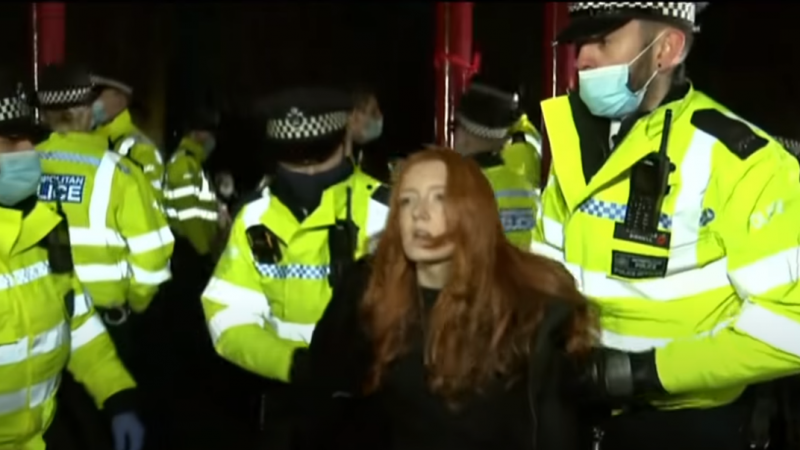Reclaim These Streets win a legal challenge against the Metropolitan police in a decision hailed a ‘victory for women.’

The Met Police breached the rights of the organisers who planned a vigil for murdered Sarah Everard over their handling of the event – high court judges have ruled.
The vigil was organised by Reclaim These Streets (RTS), a group committed to protecting women’s personal safety in public spaces. The group say it welcomes the judges’ decision as a ‘victory for women.’
RTS say they had approached the Met to propose a socially distanced vigil on Clapham Common for 33-year-old Sarah Everard, who was murdered by Wayne Couzens, a serving Met officer in March last year. The event was also intended to be a protest about violence against women.
A group of women who founded RTS and had planned the vigil, launched a legal challenge against the police force over its handling of the wake for Everard. After being told they would face fines of £10,000 each and possible prosecution if the event went ahead, the women withdrew from organising the vigil and a spontaneous gathering and protest took place instead.
A breach of human rights to the freedom of speech and assembly
During the two-day hearing in January 2022, Jessica Leigh, Anna Birley, Henna Shah and Jamie Klingler claimed that the decisions by the Met about the planned vigil equated to a breach of human rights to freedom of speech and assembly. They argued that officers failed to assess the potential risk to public health, at a time when London was under lockdown due to Covid-19 restrictions.
On March 11, Lord Justice Warby and Mr Justice Holgate concluded that the Met’s decisions in the run-up to the event were “not in accordance with the law” and ruled in favour of RTS.
In a statement following the ruling, RTS said: “Today’s judgment is a victory for women. Last March, women’s voices were silenced. Today’s judgment conclusively shows that the police were wrong to silence us.
“The decisions and actions by the Met Police in the run-up to the planned vigil for Sarah Everard last year were unlawful and the judgment sets a powerful precedent for protest rights.”
A ‘huge win’
Patsy Stevenson, who was arrested at the vigil, described the ruling as a “huge win”, saying: “Women are fighting back now.
“As soon as I found out, I just burst into tears. It’s a huge win and it just shows we should have been able to do it and that the police were in the wrong. That’s what we’ve been saying the whole time, but no one listened or understood,” Stevenson added.
In a statement after the ruling the Met Police said it was “considering very carefully” whether it should appeal.
In response to the potential of an appeal, RTS said: “We hope that the police learn some important lessons.
“And if the police appeal this decision, we think it would further erode women’s trust in the force.
“Instead of wasting taxpayers’ money on an appeal, we hope that they will invest the funds in measures that tackle misogyny and keep women in London safe.”
One year on from the announcement of controversial policing bill
The ruling comes a year on since the Police, Crime, Sentencing and Courts Bill was announced on March 9, 2021. Labelled as “draconian” for its anti-protest measures, the Bill sparked a wave of protest and uprising, up and down the country.
In February this year, peers inflicted a series of defeats on the legislation, which was described by one peer as the “biggest threat to the right to dissent and the right to protest in my lifetime.”
The House of Lords rejected controversial measures aimed at creating a new offence for “locking on” tactics, which make it more difficult for protesters to be removed from demonstrations. Peers also sank measures to enable officers to stop and search those at demonstrations “without suspicion.”
The home secretary Priti Patel wrote to MPs urging them to back the anti-protest legislation, after it was rejected in the House of Lords.
Peers also amended the bill so that it makes misogyny a hate crime, introduces new powers to tackle the issue of sex for rent, and create a “duty of candour” for police. However, in her letter to all 650 MPs, Patel said she would oppose these changes.
Gabrielle Pickard-Whitehead is a contributing editor to Left Foot Forward
To reach hundreds of thousands of new readers we need to grow our donor base substantially.
That's why in 2024, we are seeking to generate 150 additional regular donors to support Left Foot Forward's work.
We still need another 117 people to donate to hit the target. You can help. Donate today.



